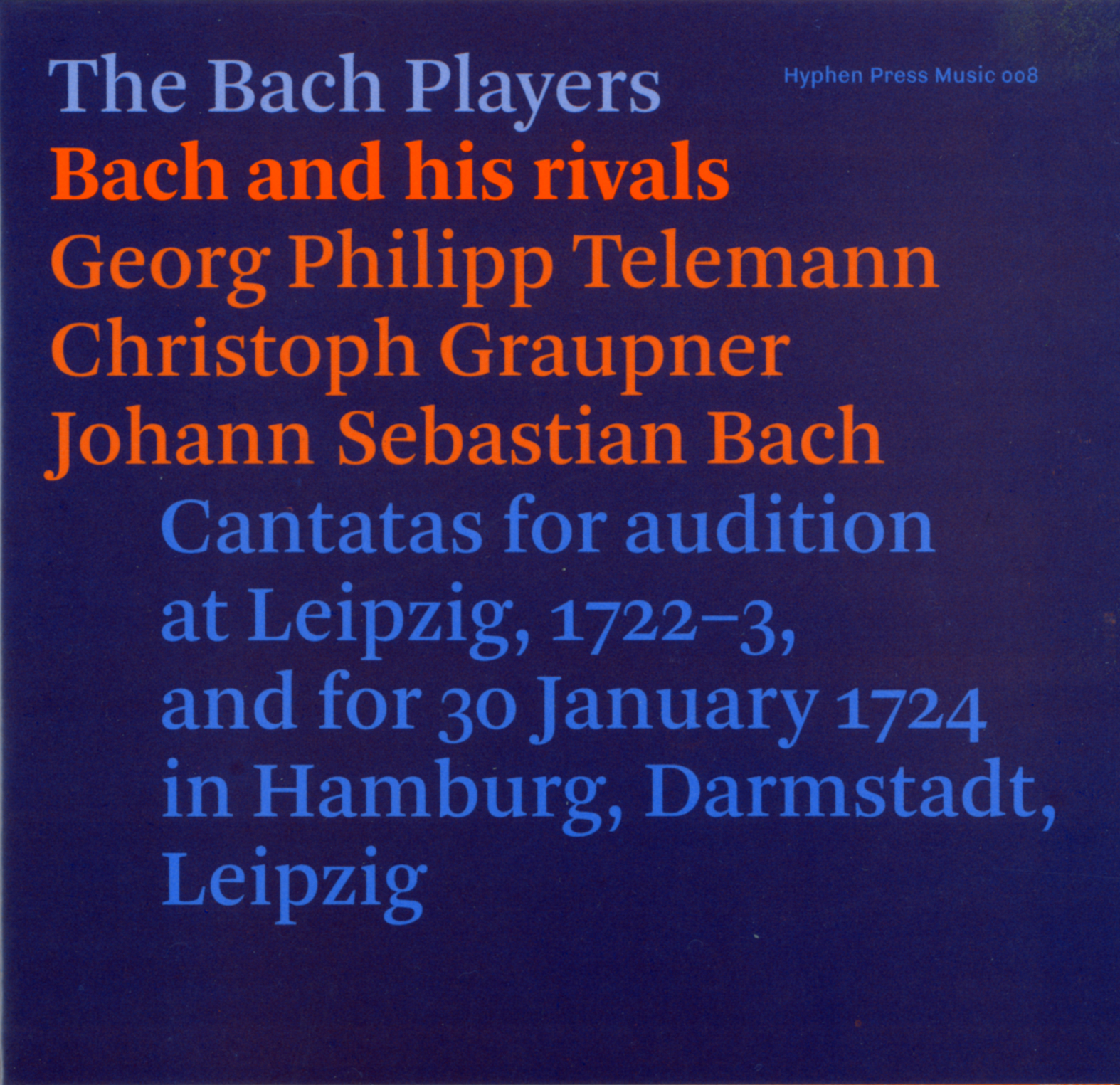Back to Recordings
Bach and his rivals

This double CD presents two sets of cantatas by three composers: Telemann, Graupner, and J.S. Bach. The first disc has cantatas composed in 1722–3 as audition pieces for the job of Kantor at the Thomasschule in Leipzig. Both Telemann and Graupner were attractive and likely candidates, as these works prove. Bach – despite his subsequent glory – was the outsider. The second disc gives us cantatas by the same three composers a year later, composed for the same Sunday, 30 January 1724. The gospel reading for that day tells the story of Jesus stilling the storm at sea: the music reaches dramatic heights. These cantatas, with the addition of instrumental works by Telemann and Graupner, paint a substantial picture of music in Germany at that moment.
The music
CD1
Christoph Graupner (1683–1760):
Cantata ‘Aus der Tiefen rufen wir’, GWV 1113/23a
Georg Philipp Telemann (1681–1767):
Ouverture in F sharp minor, TWV 55: fis 1
Cantata ‘Wer sich rachet’, TWV 1: 1600
J.S. Bach (1685–1750):
Cantata ‘Jesus nahm zu sich die Zwölfe’, BWV 22
CD 2
Georg Philipp Telemann:
Cantata ‘Laß vom Bösen und tue Gutes’, TWV 1:1038
Christoph Graupner:
Ouverture in C minor, GWV 413
Cantata ‘Gott führt die seinen wunderbar’, GWV 1115/24
J. S. Bach:
Cantata ‘Jesus schläft, was soll ich hoffen’, BWV 81
The musicians
The Bach Players:
Rachel Elliott soprano
Sally Bruce-Payne alto
Simon Wall tenor
Matthew Brook bass
James Eastaway oboe
Catherine Latham oboe / recorder
Rachel Beckett recorder [CD2]
Nicolette Moonen violin & director
Stephen Pedder violin [CD1]
Anne Schumann violin [CD2]
Rachel Stott viola
Kinga Gáborjáni cello [CD1]
Olaf Reimers cello [CD2]
Alastair Mitchell bassoon
Pawel Siwczak organ / harpsichord
Recording & production
Producers: Nicholas Anderson (CD1); Roy Mowatt (CD2)
Recording engineer: Alan Mosley
Editing and mastering: Nicholas Parker
CD1:
Recorded at St Michael’s Church, Highgate, London, 8 to 10 October 2012
CD2:
Recorded at St Michael’s Church, Highgate, London, 8 to 10 October 2013
Presentation
A 32-page accompanying booklet includes an essay on the music by the composer Hugh Wood and violinist Stephen Pedder. Texts of the cantatas are given, with English translations added. There are photographs of the musicians in rehearsal and in concert. The CDs and booklet are held in a packet made of card and without plastic.
Reviews
… a group like this, performing cantatas as intimate chamber music, never has to force their sound. This is a huge advantage over large-scale performances directed ‘at’ rather than performed ‘among’ their listeners.
As always with this group’s products there is a minimalistic package, concealing a very well researched and intriguing essay by Hugh Wood with Stephen Pedder giving both the background to these auditions and a detailed analysis of the music. This is programme planning of a high order, and we are lucky to eavesdrop on their performances.
David Stancliffe, Early Music Review, April 2015
The object of the exercise is not to praise the winner of the competition yet again … but to offer a space for something like dispassionate comparison. In this, the programme and the performances succeed.
Fabrice Fitch, Gramophone, June 2015
It certainly has the real Baroque verve.
Frits van der Waa, De Volkskrant, 13 May 2015
It’s a delicious line-up. And because of the way that the instruments and voices are doubled and supported in this period – and on this disc – I always want to feel that the instrumentalists are really singing, and that the singers have a very strong sense of an instrumental line. I really get this on this recording.
Caroline Gill, CD Review, BBC Radio 3, 24 April 2015
In summary, an interesting release, outstandingly played and sung, with an especially nice leading part for the oboe, and an honourable mention for the bass soloist Matthew Brook. Atmospherically recorded in a small church, and thus with exactly the right ambience for the chamber-music approach, and – last but not least – provided with extended and extremely informative explanatory texts (in English only), and with all the sung texts.
Siebe Riedstra, Opus Klassiek
The Bach Players give pleasingly sound interpretations. There is no ostentatious virtuosity: the beauty comes from within. This British ensemble is, by the way, directed by the Dutch violinist Nicolette Moonen.
Timo Wind, De Telegraaf, 7 July 2015
It’s a marvellous concept and serves to show why Telemann and Graupner were so highly thought of: the former is light and urbane, influenced by the French style; the latter’s style is grander, stemming from his associations with the opera and the court. And Bach? Well, he’s sui generis – it’s difficult to ignore hindsight, but even in his audition cantata one feels a presentiment of what was to lie ahead in his 27-year tenure in Leipzig. The performances by The Bach Players are at their customary exemplary level; the continue group is quite excellent. The stand-out performances, however, come from the four singers, of whom bass Matthew Brook is just slightly primus inter pares. For a sense of why the right decision might have been made after all, listen to Bach’s cantata ‘Jesus schläft, was soll ich hoffen?’: some lovely wind playing and spirited strings are complemented by outstanding singing, not least by tenor Simon Wall in a flying trapeze of an aria.
Adrian Horsewood, Early Music Today, December 2015 – February 2016